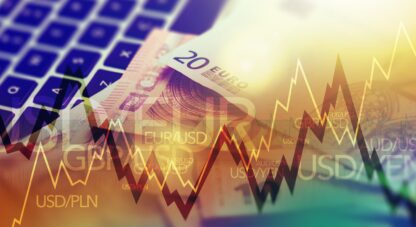Podcast: Play in new window
-
Barring A Sudden Shock, The Doller Hegemony Will Last Longer Than Many Think
-
CBDC Turning A Tool Of Independence Into A Tool Of Social Control
-
Pouring Mathematical Water On The Fires Of Hyperbole
Click Here To Register for Tactical Short Quarter 1 Recap Call
When Is The Dollar Done For?
April 19, 2023
“Overstatement of a fact creates issues beyond the relevant fact, and there may be a fact in play, but it creates more heat than light. Can we stick with the relevant facts without resorting to hyperbole or catastrophism? When we make a point, it seems easier to go the opposite direction and to underscore, to highlight it, to otherwise exaggerate what’s true, fearing that we won’t be heard. I think we’ve learned that the carnival barker turns more heads.” — David McAlvany
Kevin: Welcome to the McAlvany Weekly Commentary. I’m Kevin Orrick, along with David McAlvany.
On Monday nights we meet, we talk, we enjoy each other’s company. Often times we’ll enjoy a scotch or something like that. But also you ask me typically what’s on people’s minds this week, because one of the things that we both do—I think probably myself even more than you because you’re doing a lot of analysis and meetings with the guys here—but I’m on the phone with clients really morning to night. You can get a feel for where people are at just by simply listening to them, and the CBDC, CBDC, CBDC. It just keeps coming up in conversation. Everyone wants to know.
David: Central bank digital currency.
Kevin: Exactly.
David: Yeah. On everyone’s mind these days seems to be the US dollar, its distinguished position in the global economy and the talk among central bankers of moving towards the digital currency. Not decentralized. Not decentralized, as the early iterations of crypto have been, but instead centrally controlled. Controlled as a tool for central planning. I was on a Zoom call with a number of people the other day and had a mild debate. This was a few weeks ago, actually. I was told that central bank digital currencies are nothing to worry about because the nature of crypto is decentralized and runs away from any dystopian notion of corralling economic agents and prodding them towards specific choices.
Kevin: Yeah. Well, not when it’s centralized.
David: Simply put: central bank digital currencies are dead on arrival because of the nature of crypto. That was the argument, and I disagreed with the assumption that decentralization represents a form of system independence that allows for total freedom of choice. In this case, decentralization has a specific and limited meaning as it relates to proof of work as a stand-in for a centralized governing body. Reading too much into the nature of the product, I think, would be problematic. I disagree that the architecture of crypto is inherently liberal—and I’m talking about the old sense of the word liberal: promoting freedom of choice and privacy through an implied opacity. Again, that’s kind of the net benefit of decentralization. Privacy—all we need to do is ask the dread Pirate Roberts about that. You might recall that’s the fictional identity of the man that—
Kevin: Princess Bride.
David: —ran the dark web at Silk Road.
Kevin: Yeah.
David: Yeah. And yes, it goes back to the 1990s and the Princess Bride.
Kevin: Yeah. I think about it. It’s a misunderstanding. Decentralization of the currency, if it’s independent and it’s not connected to a government, of course gives you privacy. Once you take that same reporting power, that blockchain reporting power every 10 minutes, just absolutely solidifying every part of the transaction and everybody who’s used it—
David: A permanent record.
Kevin: Yeah.
David: A permanent record. It may be the book we read, The Panoptic Sort, in our discussion with Oscar Gandy. It may also be the discussion with Nazli Choucri. That goes even further back, maybe 2011, on the question of who controls the internet and the technological pipes that allow for “decentralized proof of work.” Yes, there’s an aspect which is obviously decentralized, but the issue of control, kill switches, and the nature of data suggests that when we peer into one end of the fiber optic line, the peering goes both ways.
Kevin: When you interviewed Nazli Choucri, that was a fascinating interview because she talked about how the internet has really overlaid any kind of national boundary. What used to be politics and what used to be nations is really changed quite a bit when people are talking to each other past national lines. Liberal, conservative, Democrat, Republican, it doesn’t make as much difference as control or not to control.
David: Yeah. If we’re concerned about the US dollar’s de-evolution, I’m not convinced that it’s the dollar’s demise that is the most concerning, but instead that evolution of currency towards an exclusively digital iteration. That reflects Ken Rogoff’s very prescient explanation. “The long history of currency tells us that what the private sector innovates the state eventually regulates and appropriates.” Welcome to the digital panopticon (a prison where all inmates can be observed at all times by a single guard).
Kevin: Yeah. Well, it really boils down to top-down control. You’ve got the liberal side and then you’ve got almost the anarchist side on the other side of things, but whatever it is, if there’s somebody who’s trying to control you, that’s a form of tyranny.
David: When we were talking about Regulate Wall Street and the whole push, 2008, 2009, the protests in downtown Manhattan, there was this bending of the political spectrum. The right and the left, they were asking for blood. Someone was going to be hung in effigy. There are times when the political spectrum from far left—liberal, veering towards socialist—and far right—libertarian, leaning towards anarchist—bend towards each other and have something in common. The common ground today is the dollar’s demise.
Recently you’ve got da Silva—that is Luiz Inácio Lula da Silva, Putin, Xi, Macron, these masters of the left have declared the dollar system as dead, and in its place a multicurrency trade settlement arrangement. Now, that multicurrency trade settle arrangement has yet to be created. It has yet to function as a real substitute. We talked about this specifically looking at statistics from the Bank of International Settlements about two months ago, which support the fact that very little has changed. The discussions about what may change and what people want to change are in fact quite different from what has occurred. Nonetheless, to the left, the dollar is as dead as capitalism. We know that capitalism—it’s already met its demise as a result of the inevitable progress of man through dialectical improvement, leading ultimately to a blissful world of endless government cheese.
Kevin: Well, and it’s funny how the left fights capitalism thinking they know what they’re talking about, but we haven’t had capitalism in an awfully long time. What we would consider right now would also criticize the system.
David: Sure. The right comes to the same conclusion on a very different basis, and may I say not unreasonably so. I think it must be said that not every person concluding that the dollar has problems is far left or right. I recall Pete Peterson writing a short diatribe against our over-leveraged financial system more than a decade ago. The bending of the spectrum of political idealism is still worth noting. For some, it’s a concern. For others, it’s a conviction, this thing about the dollar. Change is the unifying shared ground.
Kevin: Isn’t it interesting, though, the dollar now invokes an emotional response? It’s just a currency. Why would we have an emotional response about the dollar? But just about everybody does, for their own reason.
David: Yeah. Why is the dollar system in question? Could it be the unsustainable level of debt?
Kevin: That makes me mad.
David: Could it be the rising cost of that debt as interest rates normalize in the context of an Everest-like mountain of obligations?
Kevin: Right.
David: Could it be the unsettling use of the US dollar as a weapon of US foreign policy? We’ve seen sanctions this last few years. Could it be the record of negative interest rates which are now recorded for your foreign investor from 2008 through the present? That may plant seeds of doubt amongst our friends accustomed to financing our excessive spending. For so long it’s been a benefit to us.
Kevin: Not them.
David: Not necessarily to them. Perhaps it’s the maturity of our economy. We’re not a young economy anymore, and we’re struggling to keep our growth rates above our interest rate. This issue of rates seeking the light of day, again, positive in real terms, getting out of the negative territory into the light of day. It’s forced, of course, by the excessive consumer price inflation that we have, but at a certain point those interest rates attract positive attention. They’ve unhinged SVB, rising interest rates have caused problems on the balance sheet of insurance companies as well as banks, but we also like higher rates. Then again, if they go too far on the upside, there’s negative attention. Everybody loves making eight or 10%, particularly if inflation is four or five or six, but everybody is concerned if you’re talking about 30 or 40% because now all of a sudden it’s a rate that’s too high and suggests that there’s risk attached, and that’s what’s being priced in to that particular IOU.
Kevin: Yeah. I remember the days, Dave, back in the early ’80s, people were like, oh yeah, I was getting close to 20% on my CDs. Well, that’s because inflation was really high. If you could lock something in like that, you could go to the bank for quite a while.
David: Then as inflation dissipated, it was to your benefit.
Kevin: Sure, but yeah, 30 to 40%, that’s something that you might be getting in Argentina and it’s like, wait a second. These are not good interest rates. But interest has a special effect on certain industries like tech.
David: Yeah, we’re seeking the interest rate sweet spot right now. We still have a long way to go. Leading the rally in equities we’ve seen the tech giants. As interest rates came up, tech got battered last year. Interest rates have alleviated a little bit in the last month or so, and as a result tech has gone on a tear.
Now, if you look at the broad equity markets, breadth—which is a measure of the dispersal of returns, positive returns—breadth has been terrible. You’ve had most of this equity market rally tied to five tech names. With higher rates, frankly, comes the next leg of the death march for tech.
Again, we look at the sweet spot for interest rates, they need to be higher. They need to get above the rate of inflation, or we need to bring inflation lower. The sweet spot for the saver or retiree is a higher number, but the sweet spot for the saver is also the bulls-eye on the back of technology companies. You’re seeing this with companies that are now reporting: Apple, personal computer shipments off 40.5%; Dell, shipments off 30%; HP, shipments off 24.2%.
This is what we were talking about last week. We talked about business spending, enterprise software and hardware. It’s sending a signal. Leadership in equities from tech is a very short-lived thing when all you’re really looking at is a relief rally in tech as a result of a drop in rates very temporarily. Now we’ve got this issue of the Fed increasing rates yet again, and the market’s pricing in a 90% probability that at the next meeting we’re up again 25 basis points. Just more pressure on the equities markets.
Kevin: Well, David, lest we are talking about the dollar’s demise, we might be premature actually on the dollar’s demise if you look at how much the dollar actually buys relative to these alternative currencies that we’re hearing about. Now take the CBDC out of it. Let’s just go ahead and talk about the value of the dollar the last couple of years because we were hitting records as far as how much it bought relative to other currencies.
David: Well, that’s right. The US dollar reached 20-year highs last year. Lest we so quickly forget amongst the celebration by some that the dollar has lost some ground, and the mourning by others that the US dollar has already died, we have a price correction. We have a price correction off of two-decade highs, with a level still well above what the price has been for the majority of the last century. The dollar can move higher on the back of higher rates, and that’s what we’ve seen, and it can move higher on the back of global financial market stress, which is also a possibility as we get into the latter part of this year where people treat the dollar as a safe haven. The point is, the dollar can move higher. It seems like the left is projecting what they want to happen to the dollar.
Kevin: Well, South American nations, why would you take your advice about currencies from South American nations?
David: Argentina’s at 104% inflation rate this year, following a socialist playbook. Communist Venezuela’s inflation rate has normalized, has normalized at 155%, off of its 2018 levels of 33,000%. Is the dollar in a bad place? In some respects, yes.
Kevin: Lula thinks it is, and Lula of course is another South American.
David: But let’s not assume the Lula pot calling the kettle black is objective criticism. Lula is a Latin hot mess with a penchant for graft and inflation. His analysis of the dollar, does it have credibility? The ones that he doesn’t like are the dollars he hasn’t stolen yet.
Kevin: Biden likes him.
David: Then we have Biden say, oh, congratulations on the win, this election in Brazil. Quite the statement. Frankly, I think they both look better in pinstripes.
Kevin: We’ve been asked the question, what is giving the dollar stability? There really are three pillars, and the last one is supplied by the military. First pillar was gold, the second pillar was the petrodollar status, and then the third pillar is Bretton Woods’s reserve currency status. We are the currency of choice. If we’re not the currency of choice, up to this point, we’ve been able to enforce that with our military. Now we’ve lost the gold pillar. The petro pillar is being challenged at this point with other currencies being able to buy oil, but that third pillar may be a very large, stable pillar as long as we can defend it.
David: When I think about the Bretton Woods and what came along with that, we are the largest economy with the deepest capital markets, and that provides us a safe place, and people are looking for stability. Again, you may not like 6 to 8% inflation rate here in the United States, 5% on the last CPI number for the headline, but the Venezuelan inflation rate, the Argentinian inflation rate, you go across the pond of the UK and it’s double that, close to 10%. What you’re gaining is breadth, depth. This is a stable market. Doesn’t mean it stays that way, but is it a new paradigm and the end of our reserve status, or are we going to maintain the status quo with certain caveats?
On the one hand, you should never underestimate the incumbent advantage, but you should never merely take it for granted either. There’s reasonable criticisms to lay at the feet of the dollar. I just don’t think you can go on that slippery slope logic and say, problem today is demise tomorrow. Yes, the dollar system has its detractors. Yes, the dollar system has multiple cracks appearing in its edifice. Yes, the dollar system may someday be compared with the two vast and trunk-less legs of stone that stand in the desert. You remember Shelley’s poem, Ozymandias?
Kevin: I think that’s probably your favorite poem.
David: I love it. Ozymandias is the Greek name for Ramses.
I met a traveller from an antique land,
Who said—“Two vast and trunkless legs of stone
Stand in the desert . . . Near them, on the sand,
Half sunk, a shattered visage lies, whose frown,
And wrinkled lip, and sneer of cold command,
Tell that its sculptor well those passions read
Which yet survive, stamped on these lifeless things,
The hand that mocked them, and the heart that fed;
And on the pedestal, these words appear:
‘My name is Ozymandias, King of Kings;
Look on my works, ye Mighty, and despair!’
Nothing beside remains. Round the decay
Of that colossal Wreck, boundless and bare
The lone and level sands stretch far away.”
Kevin: That is such an amazing poem, and it does show that empires do fall, but sometimes it takes longer than we think. When you go back to England, Britain is an amazing place to go to because you see the gilding on the castles and the various things, and they really were the last big large reserve currency. The sun never set on the British empire.
David: Death, like any process, often takes longer than we think. The terminal stage of the pound sterling could have been 1915, 1931, 1949, 1967, 1992, or even during the pandemic—yet another devaluation of the pound. The truth rests somewhere in the middle when the British were no longer able to project global power—this is a really critical point—when they were no longer able to project power on a global basis. I see it not as a currency event corresponding to those monetary policy choices and reflecting in the sterling devaluations in the years that I just mentioned—
Kevin: So you’re saying it is military?
David: 1956, when the Suez Canal could no longer be held by the British, that’s when the lions of Trafalgar fell silent.
Kevin: That’s interesting.
David: Projecting power was ended then. If you want to go back a step further, remember the end of the Ottoman Empire, 1922, after 600-plus years, the British ended the Turks’ ability to project power. Then you have Paris and London redefine a map, and no longer is it Constantinople that says, here is where the outer limits of our power are. It’s Paris and London saying this is the sandbox you will play in.
Kevin: Well, let’s go back 2000 years, or at least 1600 years. Pax Romana, Pax Romana—that was going to be the empire that never failed. Yet Churchill wrote in A History of the English Speaking Peoples that they had found a huge hoard of gold in England, buried about 400 AD, because the Romans were destroying their currency.
David: Right. The loss of stability in the Roman currency is a 400-year period, and it didn’t happen overnight. There were accelerations in the decline around particular periods of crisis, but before we write off the dollar entirely, I think it’s worth considering its detractors.
Kevin: Lula. Her name was Lula. Oh no, his name was Lula.
David: Right. He takes the pandering of the Chinese and he asks out loud, how did we come to agree that the dollar should be in this preeminent position globally?
Kevin: Can he even read history?
David: Well, he’s the freshly elected leftist president of Brazil. Obviously he didn’t take the time to brush up on his history while serving 19 months in jail for corruption. Literally just got out of jail. Then he wins an election. No problem here. Our president wants to pat him on the back.
Kevin: He should have had time to read it.
David: Had he read his history, he would encounter America paying for the rebuilding of Europe after World War II. Had he read his history, he would know that consensus on the global dollar role was found at Bretton Woods with Harry Dexter White and John Maynard Keynes battling over the details. The US and our disrespected dollar contributed more than any other country and source of value to the post-war return to normal. It was the American dollar system that was the critical link in financing a recovery and a rebuilding of the world.
Kevin: One of the things you’re bringing out is really hitting me from a historical standpoint, Dave. The United States has represented freedom and the rule of law up to this point. The Bible talks about equal weights and equal measures. When we were on the gold standard, it wasn’t equal weight and equal measure, so we went off of that, but let’s look at the alternatives again. Even the Chinese— People say, oh, well, the Chinese yuan is going to be the next great currency. Didn’t they just stimulate their economy with $2 trillion worth of yuan?
David: Yeah, it’s not exactly the source of stability. It’s not this bastion of freedom which invites capital. Notice they still have yet to make their currency fully convertible. There’s some things that you go, wait a minute, that’s pretty darn backwards.
Kevin: These are people who killed their own people. We’re not talking just about currency here.
David: No, I think what’s happening is we’re forgetting a few things. We’re allowing the left to bury the past. It was socialism and communism which destroyed tens of millions of lives, and to this day continues to impoverish not only the thinking of much of the world, but the material wellbeing of its ideological adherence. Americans don’t flee to Cuba. Americans don’t flee to Venezuela. Americans don’t flee to North Korea. Chinese students flock to American universities, not the other way around.
Follow the immigration patterns and you can see that we’ve got something kind of interesting here. Perfect? Absolutely not. But you can see that the US dollar and the US system, as awful as it has become, still stands head and shoulders above the alternatives. Imperfect? Very much so. Fair in every respect? Hardly. Just according to the law? No. Rapidly deteriorating in many respects. However, we are merely catching down to the rest of the world. Before assuming that the demise of the dollar is the greatest tragedy on earth or the most obvious inevitability, remember that our demise pales in comparison to the pressures and strains felt elsewhere.
Kevin: You’re still a dollar bear, but in the long run.
David: I am a dollar bear. Don’t get me wrong. Count the 378 billion dollar monthly budget deficit in March, bringing the year to date number to $1.1 trillion, setting us up for a two trillion dollar full-year deficit, and we have yet to go into recession. Not good. Not good, but in the context of global financial pressures, the dollar still stands like Ramses II: 57 feet tall and still projecting power and stability globally. There is a likelihood of change, of erosion, even a toppling, but it’s worth working through the process, which is different if it is a gradual erosion versus a deliberate sabotage. I can’t argue against the effects of age—to be frank, my knees are not yet recovered from the last marathon—but the long-term sense of inevitability, of decaying—the currency, that is, not me—needs to be separated out from the short-term strategies which are created to deliberately undermine the world order as it stands today.
Kevin: Well, and this brings balance into the equation too, because as you watch these empires fail, rarely ever is it a sudden event.
David: No. The ancient statue no longer projects power across the Middle East. It’s collecting dust in the British Museum in London. This was an actual statue. It’s not just a poem. The poem was inspired by a statue that Percy Bysshe Shelley saw in Egypt. The dollar may someday be a relic, like Ramses II, but there is a long journey from here to there.
Kevin: This is why there are some programs on the radio and these days on the internet that are so popular for a short period of time, because they’re hyperbolic. In other words, they freak people out. They’re like, by April the dollar’s going to be a dead currency, or by September, or this or that. Oftentimes, in fact every time, that’s not the case.
David: The easiest analysis is always hyperbolic. What begins on the open plane climbs unstoppably to the stars—
Kevin: It hockey sticks out. But it certainly sells. It certainly sells to the short-term listener.
David: Yeah. Our aspirations and our hopes, they have a psychological seed, just as our worst fears do too. What hyperbole does, our imaginations run unstoppable to the extreme, to a terminus, so the parabolic curve and hyperbolic speech are connected by a psychological fatalism which sees small graduating quickly to infinitely large, and sees infinitely large once it begins to shrink at all—well, it might as well disappear altogether. It’s the exponential trend which then is extrapolated, and the imagination draws the line forward without limitation or qualification. It’s bad math, just like it’s bad manners.
Kevin: We have talked to people on the Commentary who mistake balanced curve with a parabolic curve, and I’m not going to name names, but oftentimes it sells, but the problem is it’s wrong.
David: Well, I tell my kids that hyperbole is a fabulous literary device, but it makes a mess of relationships. Again, this is the manners part. You always do this. You never do that. Overstatement of a fact creates issues beyond the relevant fact, and there may be a fact in play, but it creates more heat than light. Can we stick with the relevant facts without resorting to hyperbole or catastrophism? When we make a point, it seems easier to go the opposite direction and to underscore it, to highlight it, to otherwise exaggerate what’s true, fearing that we won’t be heard. This is a part of the modern period that we live in. I think we’ve learned that the carnival barker turns more heads.
Kevin: More views, more views. If you say something radical and scary, it’s going to get more views.
David: As we move towards change in the global economy and in the structures that support the status quo, hyperbole is the stuff of war, and we should steer clear of it. Not just thinking of currency and currency demise, the end of the dollar, what have you, de-dollarization, but what we need to steer clear of is overgeneralizing, and then again, using a highlighter. That use of hyperbole when it comes to politics and when it comes to geopolitics becomes very dangerous. We just need to steer clear of it. Hyperbole is the stuff of panic. Hyperbole is the stuff of over-reactionism that lands us in costly conflicts, which may, as we have so often said, compress time. Crisis compresses time. To avoid the compression of time, we would do well to not judge others or judge our circumstance with hyperbole.
Kevin: This is why it’s good to have a process. You were explaining to me last night that you’ve had an exchange student living with you from France, and he’s going to be going back soon, but you invited him in to listen to the process of how McAlvany Wealth Management makes their decisions. Would you explain that to the audience a little bit?, because it was fascinating to me. I’m going to sit in on one of those meetings and listen just because I do want to see that you’re not just using your gut when you’re making these investments.
David: Yeah. We adopt a few students each year. They come over for a few meals, and we get to be a place of home for them when they need it most, being either from another state or in this case from another country. We had one from Amsterdam, one from France, and one from the Midwest—which is like its own country anyways.
Kevin: Our Midwest clients will love that.
David: Speak with just as strong an accent.
Kevin: There you go. There you go.
David: Yeah. He’s very interested in investing, so we had him come in this week and listen to our process, and it was a minimum two-hour conversation in which we go through six different spreadsheets. On each of those spreadsheets looking at 50 to 150 different data points. We’re discussing, debating, reporting, updating, and then moving towards action on the basis of what on aggregate is six to seven hundred different data points, and they’re constantly changing.
Kevin: This is you, this is Doug, this is Phillip.
David: It’s five of us.
Kevin: Morgan, Robert.
David: It’s five of us hashing this out, and it blew his mind.
Kevin: Really.
David: He’s studying finance. He’s studying investing now. But for him, it’s just pick a price trend and buy it and hope for the best. That would be—
Kevin: A really good sausage being made is what he got to see.
David: It was mind-blowing for him that there’s that much detail and there’s that much disciplined orchestration that goes into, in the end, are we moving a position up or down by a quarter of a point?
Kevin: See, there’s the balance, because if you’re thinking in hyperbole while you’re making investments, you’re going to go, oh my gosh, the dollar’s going to fail in the next couple of months.
David: We’re all out.
Kevin: We’re all out.
David: What am I missing? We’re all in. FOMO is an expression of hyperbole. It’s an emotional, crowd-oriented expression of hyperbole. We’re missing out. We got to get in now.
Kevin: Well, and you can convince yourself of anything with math, but it may be bad math.
David: As for math—as usual, Kevin, you’ve got this one—but perhaps you can explain why parabolic curves have yet to end the world as we know it. Something happens. Something always happens, leading us to the simple phrase: this, too, shall pass.
Kevin: What balances us out?
David: What is it about the parabolic curve that resolves itself?
Kevin: Ben Franklin made a comment about the United States that Thomas Malthus picked up on, and he translated it to overpopulation. Thomas Malthus is the one who came up with the parabolic curve. Ben Franklin basically said, I think the population of America’s going to double every 25 years. Malthus sat down—he was an economist, and he sat down and he said—
David: We’re not going to have enough food.
Kevin: Oh my gosh.
David: It’s too many mouths and not enough calories.
Kevin: Double every 25 years. You know the old story about the guy who asked for one grain of rice on the first chess board, the 64 squares, and then two for the second, and then four for the next. That’s more than all the rice in the world by the time you get to the 64th square, but usually somebody upsets the chess board or the wind blows. Thomas Malthus comes along, and people become absolutely panicked about population. Oh my gosh, if population doubles every 25 years—
Pierre Verhulst came in 1845 and he said, no, no, no. There is always a limiting factor—and it’s worth actually looking this equation up. I gave you a Post-It with this equation on it last night. There’s a limiting factor in the equation that always stabilizes—virtually always—a parabolic curve, whether it’s a biological outbreak of a virus, or we were talking about the pandemic and things like that. There’s a stabilizing factor that you can’t count on, but usually a parabolic curve will rise parabolically for just a little while. Then this logistic equation, is what it’s called—Pierre Verhulst’s Logistic equation—shows that there’s a balancing factor.
Now, the reason I bring this up, Dave, is I think when you guys meet— We all can come in with hyperbole. We can all panic sometimes. I know I have, but if we meet in a group and we say, okay, let’s just go back and check our procedures— The triangle is like that. You put a third in gold and silver, you put a third in growth, put a third in cash, or however you make that work. But what you’re doing is you’re saying, I’m not going to bet all-in with all of my finances.
David: So the logistic equation is what balances the parabolic curve, and just about when you’re ready to panic and lose your mind the problem has solved itself. The problem has solved itself. We have cycles in nature, we have cycles in culture, and we have cycles in finance and the economy. There is something that always happens. How bad does it get? Well it gets bad until it’s not bad anymore. There’s something that resolves itself, and that’s not to say that there’s not consequence to bad actions. I’m not suggesting that $1.1 trillion thus far in new debt added to our system, two trillion by the end of the year, 50 trillion by the time we get to 2032. I’m not talking we aren’t headed towards bankruptcy, and significant pressure is on the US dollar. That makes sense to me, but the dollar doesn’t fall out of bed in a day, and you don’t replace it as a reserve currency overnight. You have to have a substitute. There has to be something else.
Thinking of US hegemony, thinking of US dollar hegemony, what we do have is a retreat—a retreat over the past 20 years. Not so much in terms of the US dollar’s role in trade settlement or as a reserve asset for central banks. Again, the Bank of International Settlements puts the numbers, the statistics, to that. We’ve barely lost an inch of ground. Minor shifts in those categories. But a retreat in our projection of power has largely been a political choice. A retreat from the role we have had for only a brief time as global influencer of ideas and outcomes.
We were a more reluctant hegemon than the British. Almost, you could say, embarrassed by the rule. Now, we are being told by our own academics, the shapers of tomorrow’s social identity, that we should be embarrassed by who we are. The great humiliation is a process that the Left has created in order to reallocate power. It’s an iteration of redistribution. We’re not talking about money. We’re talking about a different kind of resource—power this time instead of money—but it seems to me that our military and its projection of power is still a critical linchpin for dollar dominance today. Now, if that changes, the demise of the dollar would not be so gradual.
Kevin: You’ve been listening to the McAlvany Weekly Commentary. I’m Kevin Orrick, along with David McAlvany. You can find us at mcalvany.com, M-C-A-L-V-A-N-Y dot com, and you can call us at (800) 525-9556.
This has been the McAlvany Weekly Commentary. The views expressed should not be considered to be a solicitation or a recommendation for your investment portfolio. You should consult a professional financial advisor to assess your suitability for risk and investment. Join us again next week for a new edition of the McAlvany Weekly Commentary.















